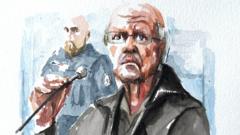Joel Le Scouarnec, a former surgeon, has been sentenced to 20 years in prison after admitting to the sexual abuse of 299 victims, primarily children, from 1989 to 2014. The ruling was delivered by Judge Aude Burési while Le Scouarnec, adorned in black, stood motionless in the courtroom. This verdict comes after the surgeon's confession earlier in March, during which he acknowledged the extent of his misconduct.
The court highlighted Le Scouarnec’s choice to prey on vulnerable and often sedated patients, intensifying the gravity of his crimes. With a mandatory minimum sentence of two-thirds, and having already completed seven years of imprisonment from a previous conviction for abusing children, he may be eligible for release as soon as 2030.
In reactions to the verdict, victims expressed their disbelief and frustration. Amélie Lévêque, a victim of Le Scouarnec, shared her fears about the possibility of him returning to public life: "To think one day he could walk down the street... that upsets me." Francesca Satta, a lawyer representing some of the victims, critiqued the sentence as insufficient given the large number of individuals harmed during the former surgeon's decade-long abuse spree, urging significant reform in sentencing laws.
Le Scouarnec, known as France's most notorious paedophile, had previously been sentenced to 15 years in prison in 2020 for raping and assaulting four children, including his own nieces. His recent trial lasted over 14 weeks, with numerous victims testifying about the lifelong impacts of the abuse. The surgeon's admission of guilt included a disturbing acknowledgment of the deaths of two victims who allegedly took their own lives following their traumatic experiences.
Following the trial, families and victims lamented the lack of systematic accountability, claiming that "no lesson has been drawn" from these significant events. Many criticized the medical establishment for failing to act on previous warnings regarding Le Scouarnec, despite his earlier conviction in 2005 for possessing child pornography.
Statements from victim representatives underscore the prevailing anger and desire for change within the judicial and medical systems. "I fear our generation has suffered in silence, but I hope for better protection for future generations," said a victim’s mother near the courthouse. Meanwhile, Le Scouarnec's lawyer defended him, asserting the sincerity of his remorse, which victims found unconvincing.
As public discourse continues about the shortcomings of institutional safeguards, the National Order of Doctors has expressed regret for their handling of Le Scouarnec's continued practice. They acknowledged a failure in communication that allowed him to harm numerous patients undeterred.
In light of these troubling outcomes, the importance of reform within the legal and medical sectors has never been clearer, as the case draws attention to the systemic failures that enabled such abuse to persist unchecked for years.




















